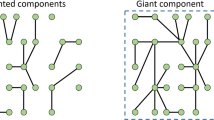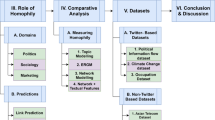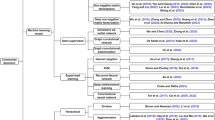Abstract
Unprecedented growth in social bookmarking systems is making accessible the perspectives of millions of users on online content. This makes possible the ability to detect temporal group formation and their transient interests in online social systems. Here, we introduce a community evolution framework for studying and analyzing social bookmarking communities over time. We apply this framework to a large set of social bookmarking data, over 13 million unique postings, collected over a period of 15 weeks. We inspect the temporal dimension of social bookmarking and explore the dynamics of community formation, evolution, and dissolution. We show how our approach captures evolution, dynamics, and relationships among the discovered communities, which has important implications for designing future bookmarking systems, and anticipating user’s future information needs.


















Similar content being viewed by others
References
Asur S, Parthasarathy S, Ucar D (2007) An event-based framework for characterizing the evolutionary behavior of interaction graphs. In: Proceedings of the 13th ACM SIGKDD international conference on knowledge discovery and data mining, KDD ’07, ACM, New York, pp 913–921
Bao S, Xue G, Wu X, Yu Y, Fei B, Su Z (2007) Optimizing web search using social annotations. In: Proceedings of the international conference on World Wide Web, pp 501–510
Bateman S, Muller MJ, Freyne J (2009) Personalized retrieval in social bookmarking. In: Proceedings of the ACM 2009 international conference on supporting group work, GROUP ’09, pp 91–94
Begelman G, Keller P, Smadja F (2006) Automated tag clustering: improving search and exploration in the tag space. In: Proceedings of the international conference on World Wide Web
Bercovitz B, Kaliszan F, Koutrika G, Liou H, Mohammadi Zadeh Z, Garcia-Molina H (2009) Courserank: a social system for course planning. In: Proceedings of the ACM SIGMOD international conference on management of data, pp 1107–1110
Carman MJ, Baillie M, Crestani F (2008) Tag data and personalized information retrieval. In: Proceedings of the 2008 ACM workshop on search in social media, SSM ’08, pp 27–34
Carman MJ, Baillie M, Gwadera R, Crestani F (2009) A statistical comparison of tag and query logs. In: Proceedings of the international ACM SIGIR conference on research and development in information retrieval, pp 123–130
Cattuto C, Baldassarri A, Servedio VDP, Loreto V (2007) Vocabulary growth in collaborative tagging systems. http://arxiv.org/abs/0704.3316
Cattuto C, Loreto V, Pietronero L (2006) Collaborative tagging and semiotic dynamics. http://arxiv.org/abs/cs.CY/0605015
Christiaens S (2006) Metadata mechanisms: from ontology to folksonomy … and back. In: OTM workshops, Lecture Notes in Computer Science, pp 199–207
Digital journal (2010) http://www.digitaljournal.com/
Esslimani I, Brun A, Boyer A (2011) Densifying a behavioral recommender system by social networks link prediction methods. Social Netw Anal Mining 1(3):159–172
Farooq U, Song Y, Carroll JM, Giles CL (2007) Social bookmarking for scholarly digital libraries. IEEE Internet Comput 11(6):29–35
Golder S, Huberman BA (2005) The structure of collaborative tagging systems. http://arxiv.org/abs/cs/0508082
Gruber T (2008) Collective knowledge systems: where the social web meets the semantic web. In: Web semantics: science, services and agents on the World Wide Web 6, pp 4–13
Guan Z, Bu J, Mei Q, Chen C, Wang C (2009) Personalized tag recommendation using graph-based ranking on multi-type interrelated objects. In: Proceedings of the international ACM SIGIR conference on research and development in information retrieval, pp 540–547
Halpin H, Robu V, Shepherd H (2007) The complex dynamics of collaborative tagging. In: Proceedings of the international conference on World Wide Web, pp 211–220
Hamouda S, Wanas N (2011) Put-tag: personalized user-centric tag recommendation for social bookmarking systems. Soc Netw Anal Min 1:377–385
Heinrich G (2005) Parameter estimation for text analysis. http://www.arbylon.net/publications/text-est.pdf
Heymann P, Koutrika G, Garcia-Molina H (2008) Can social bookmarking improve web search? In: Proceedings of the ACM international conference on Web search and data mining, pp 195–206
Kashoob S, Caverlee J, Khabiri E (2009) Probabilistic generative models of the social annotation process. In: Proceedings of the IEEE international conference on computational science and engineering, pp 42–49
Kolay S, Dasdan A (2009) The value of socially tagged urls for a search engine. In: Proceedings of the international conference on World Wide Web, pp 1203–1204
Leitner P, Grechenig T (2008) Collaborative shopping networks: Sharing the wisdom of crowds in e-commerce environments. In: 21st Bled eConference, pp 321–335
Li R, Bao S, Yu Y, Fei B, Su Z (2007) Towards effective browsing of large scale social annotations. In: Proceedings of the international conference on World Wide Web, pp 943–952
Li X, Guo L, Zhao YE (2008) Tag-based social interest discovery. In: Proceedings of the international conference on World Wide Web, pp 675–684
Liu B, Zhai E, Sun H, Chen Y, Chen Z (2009) Filtering spam in social tagging system with dynamic behavior analysis. In: Proceedings of the 2009 international conference on advances in social network analysis and mining, pp 95–100
Macgregor G, McCulloch E (2006) Collaborative tagging as a knowledge organisation and resource discovery tool. Libr Rev 55(5):291–300
Markines B, Cattuto C, Menczer F (2009) Social spam detection. In: Proceedings of the 5th international workshop on adversarial information retrieval on the Web, AIRWeb ’09, pp 41–48
Markines B, Cattuto C, Menczer F, Benz D, Hotho A, Gerd S (2009) Evaluating similarity measures for emergent semantics of social tagging. In: Proceedings of the international conference on World Wide Web, pp 641–650
Marlow C, Naaman M, Boyd D, Davis M (2006) Ht06, tagging paper, taxonomy. Flickr, academic article, to read. In: Proceedings of the ACM conference on hypertext and hypermedia, pp 31–40
Mika P (2005) Ontologies are us: a unified model of social networks and semantics. In: International semantic Web conference, Lecture Notes in Computer Science, vol 3729, pp 522–536. International semantic web conference 2005
Neubauer N, Wetzker R, Obermayer K (2009) Tag spam creates large non-giant connected components. In: Proceedings of the 5th international workshop on adversarial information retrieval on the Web, AIRWeb ’09, pp 49–52
Noll MG, Meinel C (2008) Exploring social annotations for web document classification. In: Proceedings of the ACM symposium on applied computing, pp 2315–2320
Plangprasopchok A, Lerman K (2008) Modeling social annotation: a bayesian approach. http://arxiv.org/abs/0811.1319
Plangrasopchok A, Lerman K (2007) Exploiting social annotation for automatic resource discovery. http://arxiv.org/abs/0704.1675
Ramage D, Heymann P, Manning CD, Molina HG (2009) Clustering the tagged web. In: Proceedings of the ACM international conference on Web search and data mining, pp 54–63
Sen S, Vig J, Riedl J (2009) Learning to recognize valuable tags. In: Proceedings of the 13th international conference on intelligent user interfaces, IUI ’09, pp 87–96
Song Y, Zhuang Z, Li H, Zhao Q, Li J, Lee WC, Giles CL (2008) Real-time automatic tag recommendation. In: Proceedings of the international ACM SIGIR conference on research and development in information retrieval
Twitter (2010) http://twitter.com/
Veres C (2006) The language of folksonomies: what tags reveal about user classification. Nat Lang Process Inf Syst 3999/2006:58–69
Vig J, Sen S, Riedl J (2009) Tagsplanations: explaining recommendations using tags. In: Proceedings of the 13th international conference on intelligent user interfaces, IUI ’09, pp 47–56
Wang J, Davison BD (2008) Explorations in tag suggestion and query expansion. In: Proceedings of the 2008 ACM workshop on search in social media, SSM ’08, pp 43–50
Wetzker R, Plumbaum T, Korth A, Bauckhage C, Alpcan T, Metze F (2008) Detecting trends in social bookmarking systems using a probabilistic generative model and smoothing. In: Proceedings of the international conference on pattern recognition (ICPR), pp 1–4
Willard T (2009) Social networking and governance for sustainable development. http://www.iisd.org/pdf/2009/social_net_gov.pdf
Wu X, Zhang L, Yu Y (2006) Exploring social annotations for the semantic web. In: Proceedings of the international conference on World Wide Web, pp 417–426
Xu S, Bao S, Fei B, Su Z, Yu Y (2008) Exploring folksonomy for personalized search. In: Proceedings of the international ACM SIGIR conference on research and development in information retrieval, pp 155–162
Yanbe Y, Jatowt A, Nakamura S, Tanaka K (2007) Can social bookmarking enhance search in the web? In: Proceedings of the joint conference on digital libraries, pp 107–116
Yin D, Hong L, Xue Z, Davison BD (2011) Temporal dynamics of user interests in tagging systems. In: Proceedings of the twenty-fifth AAAI conference on artificial intelligence (to appear)
Zhang D, Mao R, Li W (2009) The recurrence dynamics of social tagging. In: Proceedings of the 18th international conference on World Wide Web, pp 1205–1206
Zhou D, Bian J, Zheng S, Zha H, Giles CL (2008) Exploring social annotations for information retrieval. In: Proceedings of the international conference on World Wide Web, pp 715–724
Author information
Authors and Affiliations
Corresponding author
Rights and permissions
About this article
Cite this article
Kashoob, S., Caverlee, J. Temporal dynamics of communities in social bookmarking systems. Soc. Netw. Anal. Min. 2, 387–404 (2012). https://doi.org/10.1007/s13278-012-0054-z
Received:
Revised:
Accepted:
Published:
Issue Date:
DOI: https://doi.org/10.1007/s13278-012-0054-z




